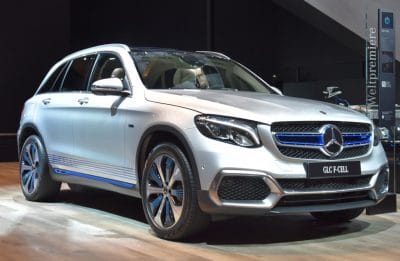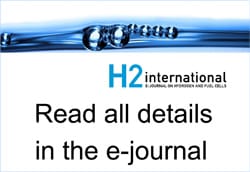There were no marketing fireworks this time at the 67th International Motor Show in Frankfurt, Sept. 14 through 24, 2017. In contrast to 6 years prior, the trade show wasn’t bent on zero-emission stickers and lush green isles but focused on simple product presentations instead.
Attendees could spot a handful of electric models and their charging points when visiting the celebration hall, the longtime site of Mercedes’ range of vehicle exhibits. All of those, however, were hybrids, including the S 560 e, E 350 e, C 350 e and GLE 500 e 4Matic, except for the GLC F-Cell. While the latter may have been touted as a world premiere, the fact remains that there was no commercially available car running on electricity alone.
When touring the 3-story building, it quickly became obvious what Daimler was proud of. A super-sized Maybach SUV and several luxury cars were the pinnacle of its booth. Only offstage did the automaker offer a glimpse into the future: the Vision Van, a concept study of a battery-powered vehicle that can drive autonomously and has a drone on its roof for package delivery.
New electric product families
The van could become part of Daimler’s recently created EQ brand, the corporation’s automotive version of emotional intelligence. Like BMW’s i series, it is said to be used to market new electric products. Aside from the van, available in the next decade at the earliest, the automaker plans to bring an electric passenger car to the market in the first half of 2019. Called EQC, it will supposedly be a mix of today’s EQ concept study and the GLC. But Daimler also showcased a concept study named EQA, whose design could ultimately prevail.
After years of one announcement following another, the GLC F-Cell was finally unveiled at the show in Frankfurt (see fig. 1).
…
GLC F-Cell
Daimler’s newest addition is a plug-in fuel cell vehicle, equipped with a 13.8-kilowatt-hour lithium ion battery. The battery can be charged at any electrical socket, while the carbon tanks incorporated into the underbody have enough space for 4.4 kilograms of hydrogen and can be filled at a gas station within 3 minutes. By the manufacturer’s account, the combined range had been measured as 500 kilometers, or 311 miles, based on the New European Drive Cycle. The GLC’s power output through an asynchronous 147-kilowatt engine was 40 percent above the B F-Cell model, while its fuel cell system was around 30 percent smaller. The use of platinum in production had been reduced by 90 percent.
VW’s new I.D. family
Volkswagen did put a bit more on the table. In the back part of its booth, the automaker exhibited its available battery electric models, e-up and e-Golf, and the plug-in hybrids Golf GTE and Passat Variant GTE. But those combined didn’t attract nearly as many attendees as the new I.D. family. Like BMW and Daimler, Volkswagen has created its own electric vehicle brand. The I.D. compact car is said to be for sale in 2020, just as the SUV crossover I.D. Crozz, and the minibus I.D. Buzz in 2022. They all use the company’s MEB Platform, a new modular system created specifically for vehicle electrification.
…
Jürgen Stackmann, board member for sales and marketing at Volkswagen, said that the e-Golf would be discontinued in 2019 and the new Golf 8 line wasn’t going to move beyond a plug-in hybrid option. He added that the similar-type I.D. would cost no more than a diesel model. Currently, however, it wasn’t planned to be equipped with a fuel cell unit.
…
Porsche displayed even less love for the technology, exhibiting only two hybrids, the Panamera Turbo S E-Hybrid and the Panamera 4 E-Hybrid Sport Turismo.
Electrified to the core
BMW, on the other hand, had comparatively many electric vehicles to show attendees. The BMW i Vision Dynamics is planned as an offer to customers for whom an i3 is too small and an i8 too big. Likely called i5, it will contribute as a 3 Series model “to electrifying the heart of the BMW brand,” as Harald Krüger, the automaker’s CEO, put it. The model, type Gran Coupé, is said to have a range of 600 kilometers, or 373 miles. And then there was the world premiere of the sportier version of the i3, the i3s. BMW’s Mini brand had another world first in the new Electric Concept. Its booth also featured the Countryman as a plug-in hybrid.
…
By contrast, Honda had the Clarity on-site and unveiled its new Urban EV Concept, whose series production is said to start in Europe in 2019. And Toyota had placed its Mirai to the front of its booth, as it had done in 2015, followed by several hybrids. It didn’t have any battery-only cars, though. Renault did, presenting both the Twizy and its Formula One racing car in Frankfurt.
To make the list complete, it should be noted that Opel brought its Ampera along, while Ford didn’t have anything electric to present.
CES for IAA
Overall, the International Motor Show again couldn’t keep what had been promised. The German Automotive Industry Association had made some bold statements about an “amazing electric transportation event,” but the truth is that, at least during the days the show was open to visitors, there was not much to see. The first few days did include the New Mobility World exposition, which heavily featured electric transportation. But it wasn’t a mind-blowing occasion either. From the around 180 organizations that exhibited their products in 2015, only around 120 were left last year. To save face, the organizer said that “overall, the exposition involved more than 250 [exhibitors, partners, sponsors, media organizations and others].” Still, it didn’t change the fact that people seem to be losing interest in the entire show. While in 2013, the auto show had 1,098 exhibitors from 35 countries present 159 world premieres to around 900,000 attendees, last year’s numbers had dwindled down around 10 percent to 1,000 and 810,000 respectively.
Some European automakers, such as Alfa Romeo, Chrysler, Fiat, Peugeot and Volvo, had already said before the show took place that they wouldn’t attend and Tesla, too, had declined the invitation. It surely puts a dent in the image of the motor show. Attendees, it seems, will soon find innovations rather at the Consumer Electronics Show in the United States instead of the birthplace of the automobile.
…
What remains is the feeling that automakers, especially German ones, have been in a deep slumber throughout the electrification years and that Germany needs to redefine its role in the automotive world.
…



























0 Comments